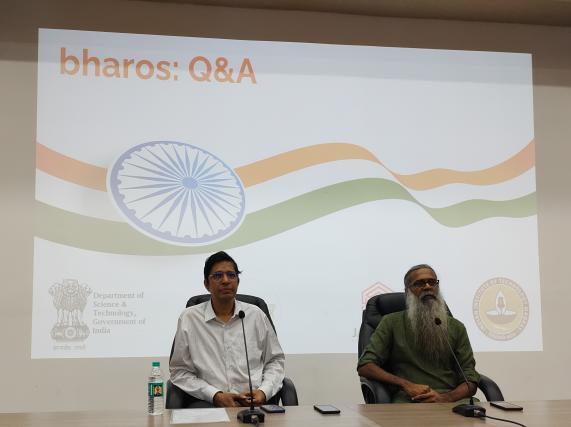India unveils a "homegrown" mobile OS to take on Android's stranglehold in the country

Last week an Indian government official said, "India is one of the largest mobile device markets in the globe. Our objective is to create a secure Indian mobile operating system that could also create choices and competition for Android's dominance in the Indian market." This took place as India's Supreme Court refused to give in to Google's request to block a ruling from the Competition Commission of India (CCI).
Google was accused by the CCI of forcing phone manufacturers who want to license the Google Mobile Services (GMS) version of Android to pre-install Google apps like Chrome, Google Search, and YouTube on these devices. Starting tomorrow, Google is required in India to end the restrictions placed on phone manufacturers who want to license the GMS version of Android. Android-powered handsets have a whopping 97% share of the Indian smartphone market.
No default apps will be offered with BharOS
According to The Register, the minister for education and minister of skill development & entrepreneurship Dharmendra Pradhan demonstrated at his workplace on Tuesday a new mobile operating system developed in India. Called BharOS, the software was announced last week by the Indian Institute of Technology (IIT).

BharOS, created in India, was unveiled last week
In announcing the creation of BharOS, the ITT said that it can be installed on "commercial off-the-shelf handsets" delivering "a secure environment for users." The operating system has no pre-loaded apps and it doesn't share any user data. Only private app stores will work with the OS. Pradhan also stated that BharOS won't run malware although there was no further explanation given.
While the operating system is installed with no default apps, native over-the-air updates will automatically disseminate security patches without waiting for the device owner to initiate the process. This means that all BharOS users will be running the latest version of the software.
Prof. V. Kamakoti, Director, IIT Madras, said, "BharOS Service is a Mobile Operating System built on a foundation of trust, with a focus on providing users more freedom, control, and flexibility to choose and use only the apps that fit their needs. This innovative system promises to revolutionize the way users think about security and privacy on their mobile devices."
Can BharOS really be considered an indigenous operating system?
Kamakoti added, "IIT Madras looks forward to working closely with many more private industry, Government agencies, Strategic agencies, and Telecom Service Providers to increase the usage and adoption of BharOS in our Country." However, it needs to be pointed out that BharOS could be considered a forked version of Android meaning that it copies the open-source code used by Android. That is what Amazon used to create FireOS for the Fire Phone. These phones do not need to have a Google Mobile Service (GMS) license but do not offer any Google apps, or the Google Play Store.
Can India really consider this an indigenous operating system when the truth is that it is built on the Android platform? And the enhanced security of BharOS could be due to the fact that it will only allow private app stores which might make it harder for malware-infected apps to be loaded on a device running the operating system. Huawei's HarmonyOS 3.0, the latest version of the operating system, removed the Android open-source code in an attempt to cut ties with Android. BharOS might do that in the future although that could still be several years away.
Here's why BharOS won't challenge Android in India, at least for quite a few years
Even though 97% of the Indian smartphone market is controlled by Android-powered handsets, currently active units won't be able to install BharOS to replace Android thanks to the locked bootloaders found on handsets in the country. Simply put, the bootloader is the first code run on a smartphone and is necessary to load the device;s operating system.
For security reasons, a phone's bootloader is locked and any successful attempt to unloock it will void the warranty of the phone. Therefore, if BharOS is going to make a run at Google's Android, it will require smartphone manufacturers to produce new handsets that run the OS out of the box.
We also want to point out that India is the second-largest smartphone market in the world. The country trails China but is ahead of the United States.
Follow us on Google News













Things that are NOT allowed:
To help keep our community safe and free from spam, we apply temporary limits to newly created accounts: